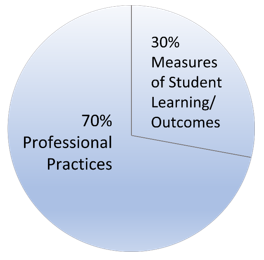You are here
Educator Evaluation Requirements
Requirements of the Colorado Evaluation System
Composition of Final Effectiveness Rating
All licensed personnel are required to be evaluated and receive a Final Effectiveness Rating (FER) every year. Beginning with the 2023-24 school year, the legislation requires that seventy percent (70%) of an educator’s evaluation in Colorado be based on the professional practices within the rubrics (Quality Standards I-IV) selected by the district that meet state technical guidelines. The remaining thirty percent (30%) is based on educator impact on student learning called Measures of Student Learning/Outcomes (MSLs/MSOs).

Final Effectiveness Rating Categories
Highly Effective
Effective
Partially Effective
Ineffective
Observations
Measures of Student Learning/Outcomes (MSLs/MSOs)
MSLs/MSOs are compiled by both individual and collective measures, and all licensed personnel are required to have at least one of each measure type. There can be up to 5 total measures attributed to any given educator.
Collective measure(s) for teachers and principals cannot exceed 10% of the total final effectiveness rating (FER) and can only use data based on the performance of students enrolled at their school.
Educators new to their district/BOCES cannot have data from previous school year(s) applied to their measure(s).
Probationary and Non-Probationary Status
Portability
Highly Effective Evaluation Process
The Highly Effective evaluation process is designed to provide a unique, meaningful evaluation process for licensed personnel who have earned an FER of Highly Effective for three consecutive years or longer. Districts/BOCES will decide if to offer the Highly Effective evaluation process to their educators before the start of the 2023-24 school year. Districts/BOCES that choose to offer the Highly Effective evaluation process must create and release implementation guidance, as well as notify educators who are eligible for the process, by the start of 2023-24. Note that the requirement of an annual evaluation remains in place.
Evaluator Training
Beginning in the 2023-24 school year, all evaluators of licensed personnel (i.e., evaluators for teachers, SSPs, and principals/APs) will be required to complete a training related to evaluation. The training will not have to be completed prior to the start of the 2023-24 school year. Beginning August 1, 2024, all new and renewed licenses will be required to complete the training. CDE will offer a combined asynchronous and synchronous training, and districts/BOCES will also have the opportunity to provide the training directly for their evaluators.
Data Reporting Timeline
Beginning in the 2022-23 school year, FER data will no longer be collected through the HR Data Collection and a new data collection called the "Staff Evaluation Snapshot" will be employed to collect FER data. The Staff Evaluation Snapshot will be open from the spring through October 15th of each year. To learn more or for questions related to the Staff Evaluation Snapshot, please contact the Research and Impact Office at edtalentresearch@cde.state.co.us.
Assurances
By July 1st of each year, school districts/BOCES are required to submit assurances that they are implementing the State Model Evaluation System or another evaluation system that adheres to the statutory requirements for teachers, principals, and special services providers (SSPs).
Quick Links


Connect With Us





